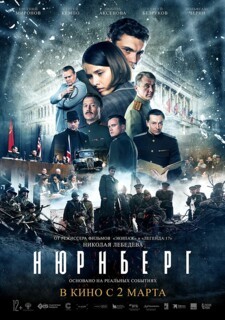Nuremberg Strikes Back
Sadakat Kadri
The Kremlin is urging Russian cinemagoers to remember 1945. A state-funded romantic thriller, depicting love, skulduggery and justice at the world’s first war crimes trial, recently opened nationwide. Nuremberg, written and directed by Nikolai Lebedev, promises to counter ‘the falsification of history’, according to the foreign minister, Sergei Lavrov, who thinks parallels with the present are obvious. ‘In a number of European countries, primarily Ukraine and the Baltic states, they are not only justifying the Nazis and their henchmen,’ he says. ‘They are reviving the ideology and practices of the Third Reich.’
Timely or otherwise, the film’s late. When it was proposed in late 2018 by the then minister of culture, Vladimir Medinsky, he was hoping for a premiere on 9 May 2020 (the pandemic put paid to that schedule). To have the movie opening on the 75th anniversary of Nazi Germany’s surrender would, Medinsky thought, help rectify another injustice. ‘In many films, in many works, the Americans write about Nuremberg as their great victory,’ he told Vladimir Putin. ‘The role of the Soviet Union is practically reduced to nothing.’
Medinsky’s fondness for patriotic cinema has never inspired a blockbuster, and a rom-com set during the construction of Crimea’s Kerch Bridge was flopping even as he was pitching his Nuremberg idea to Putin. His grievance had some substance, nonetheless. The first trial at Nuremberg is frequently misportrayed in the West as a straightforward vindication of liberalism and the rule of law.
In fact, the push for prosecuting Nazi leaders came from the Kremlin. Churchill argued consistently for summary executions, and the US position didn’t much differ until early 1945. Only Stalin, with his fondness for show trials, always thought a judicial spectacle essential. ‘There must be no executions without trial,’ he insisted in October 1944. ‘Otherwise the world would say we were afraid to try them.’
The legacy of Nuremberg isn’t defined by that detail, but a reluctance to address the implications is currently skewing perspectives on all sides. When the full-scale invasion of Ukraine began, senior Duma legislators began to talk of ‘Nuremberg 2.0’ (a term previously associated with anti-vaxxers and QAnon activists), as if nods to 1945 could legitimise the resort to force. Ukrainian and Western campaigners contemplate charges of aggression and war crimes against Russian figures from Putin downwards, as though the collaborative compromises that made Nuremberg possible were irrelevant. An innovative tribunal to judge vanquished enemies, structured and disfigured by realpolitik, is being held up as a model of neutrality and due process.
Even if it’s hard to imagine an international court with the credibility to transcend those divisions, the absence of legal consensus doesn’t amount to moral equivalence. In most countries, the messy mysteries of history remain debatable, while arrogant and hypocritical forms of nationalism constantly threaten to distort outlooks on the past. In Russia, however, citizens have since 2014 faced imprisonment for denying ‘facts established by the International Military Tribunal at Nuremberg’.
The law, enacted two weeks after the seizure of Crimea, has been enforced against some real Nazi sympathisers in Russia, but its most recent target was an anti-corruption activist, Ruslan Akhmetshin. He’s now serving two and a half years in a penal colony because, on social media ten months before his arrest, he’d condemned Stalin for invading Poland alongside Hitler in September 1939. Their alliance was too sensitive to be acknowledged by Allied judges in 1945 – and now Russians, three-quarters of a century later, are legally obliged to pretend it didn’t happen.
Most notices of Lebedev’s movie so far have been negative. Fontanka observed that the lead Soviet prosecutor of 1945, who had a strong Ukrainian accent in real life, has been made to speak impeccable Russian ‘because of the current political situation’. Two reviewers have observed, deadpan, that Nazis at Nuremberg tried to justify their war of conquest by calling it a ‘pre-emptive strike’. Another drew attention to a scene in which a bereaved German says her son died ‘defending his homeland’ at Stalingrad. ‘Homeland? In a foreign country?’ she’s asked incredulously. Overt opposition to the war on Ukraine is risky, but parallels with the past are there, if critics choose to notice.
